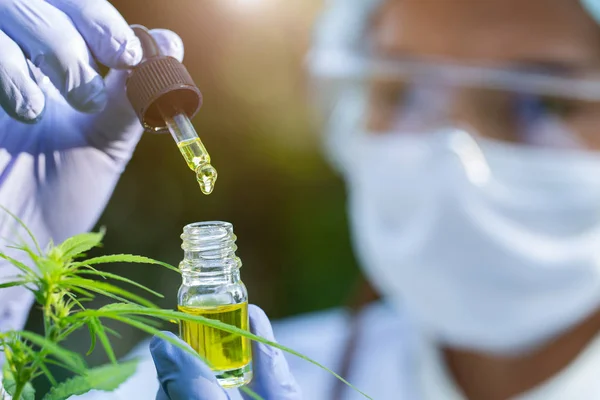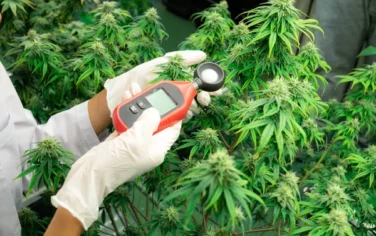Cannabidiol (CBD): Potential Benefits and Risks

November 21, 2024
Introduction
In recent years, cannabidiol (CBD) has become one of the most discussed substances in the wellness world. Many people turn to this natural compound as an alternative to traditional medications to alleviate a wide range of ailments – from chronic pain and anxiety to sleep disorders and skin problems. But what exactly is CBD? And what does science say about its possible healing properties and side effects? Let’s find out.
What is CBD and How is it Different from Marijuana?
CBD is one of the many active components of the cannabis plant. Unlike its infamous “cousin” THC (tetrahydrocannabinol), CBD does not have psychoactive properties. In other words, it does not produce the intoxication or euphoria associated with recreational marijuana.
CBD can be derived from hemp plants (which contain less than 0.3% THC) or manufactured in laboratories. It is available in various forms – oils, tinctures, capsules, gummies, creams, and even cosmetics.
With the passage of the Agriculture Act in 2018 in the USA, CBD from industrial hemp became legal at the federal level – unlike marijuana and its derivatives. This has given a powerful impetus to research into CBD’s medical potential.
10 Potential Benefits of CBD Backed by Science
Pain and Inflammation Relief One of CBD’s most well-known properties is its ability to reduce pain and inflammation. It is believed to interact with the receptors of the body’s endocannabinoid system (ECS), which influences pain perception. Animal studies show that topical application of CBD reduces pain sensations and joint swelling in arthritis without side effects.
Improving Digestion CBD can be beneficial for the gastrointestinal tract. On one hand, it reduces anxiety and stress, which often trigger digestive disorders such as IBS. On the other hand, CBD directly interacts with ECS receptors in the intestine, normalizing its motility and reducing inflammation. Data suggests that CBD stimulates appetite, helping with nausea and gastrointestinal disorders.
Antidepressant and Anxiolytic Effects CBD affects the activity of brain serotonin receptors – the “happiness hormone,” a deficiency of which is linked to depression and anxiety. Although most studies have been conducted on animals, they show promising results. Rats under the influence of CBD showed reduced behavioral and physiological (pulse, pressure) signs of stress and anxiety. The mechanism of these effects is likely related to CBD’s ability to reduce the level of the “stress hormone” cortisol.
Normalizing Sleep Sleep problems, whether difficulty falling asleep or interrupted sleep, are often caused by stress, anxiety, or pain. Thanks to its calming and analgesic action, CBD can improve sleep quality and duration. A study of patients with PTSD showed that taking CBD eased insomnia and nightmares in 91% of participants. It is believed that CBD normalizes sleep and wake cycles by reducing cortisol levels.
Weight Loss Paradoxically, CBD can simultaneously stimulate appetite and aid weight loss. It turns out that it’s all about the type of fat tissue. Research suggests that CBD helps “beige” white fat – its conversion into a more metabolically active form, burning calories as heat. Moreover, by normalizing intestinal flora and motility, CBD can reduce cravings for sweets and overeating.
Fighting Acne CBD has long been studied as a potential remedy for acne. It is believed that due to its seboregulating and anti-inflammatory action, it reduces excessive sebum production and inflammation of the sebaceous glands – two key links in the pathogenesis of acne. Moreover, CBD exhibits antibacterial activity, suppressing the proliferation of microbes involved in acne development. Today, CBD can be found in many cosmetic products.
Anticonvulsant Effect Perhaps the most convincing scientific evidence for CBD therapy has been obtained in treating epilepsy. This substance is particularly effective in severe forms of the disease, such as Dravet and Lennox-Gastaut syndromes, which are poorly responsive to traditional anticonvulsant drugs. The only FDA-approved pure CBD drug – Epidiolex – is indicated specifically for these conditions. The antiepileptic action of CBD is thought to be related to its influence on channels and receptors that regulate brain electrical activity.
Easing Side Effects of Chemotherapy Many cancer patients use CBD to reduce the side effects of cancer therapy: nausea, vomiting, pains, insomnia. For example, in one study, 72 cancer patients taking CBD capsules for a month, 67% reported improved sleep. It is assumed that CBD “deceives” the brain’s vomiting center through ECS and serotonin receptors. And by reducing cortisol levels and inflammation, it contributes to analgesia and normalization of sleep.
Reducing Headaches and Migraines CBD can become a safe alternative to painkillers for headaches and migraines. Unlike traditional analgesics, it does not lead to tolerance, which requires an increasing dose.
CBD is believed to suppress pain signals by affecting pain receptors in the brain and reducing tissue inflammation. A combination of CBD and small doses of THC may be particularly effective thanks to the synergy of these cannabinoids.
Other Potential Effects Current research is exploring CBD’s role in treating and preventing a variety of other diseases:
Neurodegenerative disorders (Alzheimer’s and Parkinson’s disease);
Cardiovascular diseases (heart attack, stroke, atherosclerosis);
Autoimmune conditions (multiple sclerosis, rheumatoid arthritis);
Psychiatric disorders (schizophrenia, bipolar disorder);
Dependency on psychoactive substances (opioids, alcohol, nicotine).
The potential mechanisms of these effects include anti-inflammatory, antioxidant, neuroprotective actions of CBD, as well as its ability to modulate various receptors and signaling pathways in cells.
How to Properly Take CBD?
The choice of how to use CBD depends on your individual preferences and therapeutic goals. The most common forms include:
Sublingual oils and tinctures (for quick and effective absorption);
Capsules and chewable tablets (for convenience and accurate dosing);
Ointments and lotions (for local analgesic and anti-inflammatory action);
Creams and cosmetics (for prevention and treatment of skin problems).
As for the dosage, there are no universal recommendations – it’s very individual and depends on weight, health condition, and desired effects. It’s best to start with a small dose (10-20 mg), gradually increasing it until the therapeutic result is achieved.
The optimal time for taking CBD also varies. For example, to improve sleep, it is taken a few hours before going to bed, and to increase concentration and reduce anxiety – in the morning.
Potential Side Effects and Risks of CBD
Overall, CBD is characterized by good tolerability and a high safety profile. Side effects are rare and usually mild:
Drowsiness and fatigue;
Dry mouth;
Dizziness;
Changes in appetite and bowel movements;
Lower blood pressure.
Typically, they are associated with high doses of CBD and go away on their own. However, CBD can interact with some medications, so it’s important to consult a doctor before taking it.
Another serious problem is the lack of strict quality control for CBD products. Many of them are marketed as dietary supplements and are not under the FDA’s oversight. Recent studies have shown that some CBD products contain less active substance than claimed or even contaminated with heavy metals, pesticides, and other toxins. Therefore, it is important to purchase CBD from verified manufacturers.
Conclusion
CBD is a promising natural compound with a wide range of potential therapeutic effects. The evidence base in support of its use for various diseases is constantly growing. The strongest scientific arguments exist for the anticonvulsant, analgesic, anti-inflammatory, and anxiolytic actions of CBD.
For many people, CBD can become a safe alternative or supplement to traditional pharmacotherapy. But, as with any supplements and medications, it should be approached with caution and always in consultation with a doctor. Only then can you fully utilize CBD’s healing potential and minimize potential health risks.
If you decide to try CBD, make sure you purchase a quality product from a reliable manufacturer. And remember – although CBD has many merits, it is not a magic pill for all diseases. A healthy lifestyle, proper nutrition, physical activity, and regular visits to the doctor still remain the cornerstones of good well-being.
Other News

Introduction: A New Era of Investment Opportunities 2025 ushers in unprecedented opportunities for investors in the rapidly growing medical cannabis sector. According to Grand View Research, the global medical cannabis market is on the brink of historic growth, with a projected value of $346.2 billion by 2030. A steady annual growth rate of 14.9% makes […]

About the Transition to USDC As of December 30, 2024, Tetra Farm has fully transitioned from USDT (Tether) to USDC (USD Coin). This change applies to all financial operations within the project, including: Purchasing NFTs Profit distribution to project participants All internal transactions Reasons for Transitioning to USDC Compliance with New EU Regulations With the […]

Introduction Laura Stewart, a professor at the University of Northern Colorado, has been studying the impact of physical exercise on immunity for over 20 years. However, her interests have shifted towards the relationship between cannabidiol (CBD) and immune system function in the last decade. The scientist is captivated by this topic, as she has discovered […]

